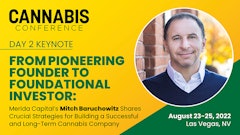
Securing funding for your cannabis business can be a formidable task—but crafting a compelling pitch deck and targeting the right investors can help soothe the process.
At Cannabis Conference 2022, Colin Kelley, senior operating partner at private equity firm Merida Capital Holdings; Patrick Rea, managing director at private equity firm Poseidon; and LeVon Terry, CEO of Capfluent Consulting, shared crucial elements of a pitch deck, necessary do's and don'ts when pitching, what makes a strong relationship between an investor and entrepreneur, and much more.
"Cannabis is a high-risk industry," Rea said. "It's an alternative investment strategy. Regarding economic uncertainty, the capital flowing into high-risk investments slows first, putting a chill on valuations for the companies and markets that carry that categorization."
Rea said there are four classes of investors in cannabis to consider: angel investors, private equity firms (such as Merida Capital Holdings or Poseidon), family offices, and crossover hedge funds.
Angel investors are individuals or a group of individuals who invest capital in early-stage businesses in exchange for equity or ownership stakes in the company. Rea said these investors were more prominent in the early days of the cannabis industry but have since died down because many didn't see the return on investment they were hoping for.
He said that private equity firms like Poseidon and Merida Capital Holdings typically raise funds from investors and then redistribute that capital into strategic investments.
"Then you have family offices. Traditionally, they move slow," Rea said. "The fourth category is the crossover fund. This is the hedge fund companies who mostly trade in public stocks while dabbling in few private companies."
Terry said depending on the macroeconomic factors that impact the industry, such as inflation and economic growth, you would have to shift and adapt to which investors you are conversing with.
"Regardless of the macro [economic factors] and what's going on in the world, there is always capital for good businesses, investments, and opportunities," Terry said. "The macro timing may create headwinds, tougher questions, and perceived risks, but those risks aren't always specific to you and your business. But you have to be ready to answer those questions and concerns the capital may have regarding their view of the market and the questions they have to answer to their investors."
Vet Investors; Ask Questions
It is crucial to vet potential investors before pitching your business deck to them to help ensure they are the right fit for your business. According to panelists, vetting investors also increases the chances of a successful partnership.
"As an entrepreneur raising capital, your time is very valuable. You don't want to waste time pitching someone for an equity investment when they [aren't a fit], and it may not be super clear from their website and materials," Rea said.
Rea said it's crucial to ask potential investors questions. For example, if your company is an early-stage technology company, you'll want to ask them if they invest in that type of company.
"Some investors will only invest in early-stage technology, while others will only invest in licensed companies, while some are only looking at brands. It's important to understand their investment strategy," Rea said.
Other common questions to consider, Rea said, are: Do they have the capital to invest? Are they in between funds? Are they investing in new companies?
"There are quite a few investment funds in the cannabis industry that have deployed their fund into new companies, and now they have the balance of the fund to invest in the winners within that fund. So, they are not investing in new companies," he said.
It's also essential to ask them where they are in their timeline. For example, if your business is projected to hit its goal in 10 years, but they can only provide a seven-year horizon, then it's probably not a good fit, Rea said.
"You want to narrow down to your target market as quickly as you can, so you can get an answer as quickly as you can," Terry said. "Investors appreciate you asking these questions early on, so they aren't wasting anyone's time. Don't be afraid to push on capital. You have something valuable for them; they need investments. … Treat them like they are going to treat you. … They will ask you tough questions, and don't be afraid to ask them questions as well."
Hire People Who Know the Investment Space
Terry says not only is it essential to know the language of your business, but it's also important to learn the language of finance or, at the very least, acquire someone on your team who can have these conversations.
"As investors, we don't expect you all to know all the questions and intricacies of venture finance, but we do hope there is someone on your team that has a good grounding in it and can help guide you through it," Rea said. "I can't make a strong enough recommendation for bringing people on your team as a consultant role or whatever role that may be to help guide you through that process because it's not easy."
Key Elements for a Pitch Deck
"The offer has got to be there, and it's got to be compelling," Terry said, adding that investors want to know exactly what they are getting and what they are buying.
According to Terry, other crucial information to include in your pitch deck is your total addressable market, the problem you are solving and your solution, what makes your solution unique, and who your competitors are.
In a pitch deck, it is also essential to address and understand the inherent risks associated with your business and the potential risks that may arise in the future—and evaluating and presenting these risks demonstrates your awareness and preparedness to handle them, Terry said.
"We all have seen thousands and thousands of pitch decks—good, bad, and indifferent," Terry said. "[Evaluating the risks] gives you a great baseline for the unknowns [and the] unknown unknowns, which are inevitable. Investors want to understand the entrepreneur can handle those risks, and the more you include that in your pitch deck … that will differentiate you and will resonate with capital."
The Deal Is Done, but the Work Just Started
Securing an investor is just the beginning of a new phase for a company. Once you confirm your investment, you now face the challenge of running and growing your business successfully while maintaining the investor relationship.
"There is stamina required to be a founder in this industry, … and that is something that people miss. They get the money and check and think, ‘Thank goodness that's over,’ but now you have to run your company, and round two of the fight starts," Kelley said. "If you have the right investment partner, you have another partner within that fight, and if you have a consultant, [well] now you have two partners."
During this phase and as your company grows, it's vital to outline strategies to build and expand your team, focus on executing your business plan and developing results, conduct regular financial reporting and analysis, conduct market analysis, and more.
Join us this year at the Paris Las Vegas Hotel & Casino for Cannabis Conference, the leading education and expo event for plant-touching businesses.






















